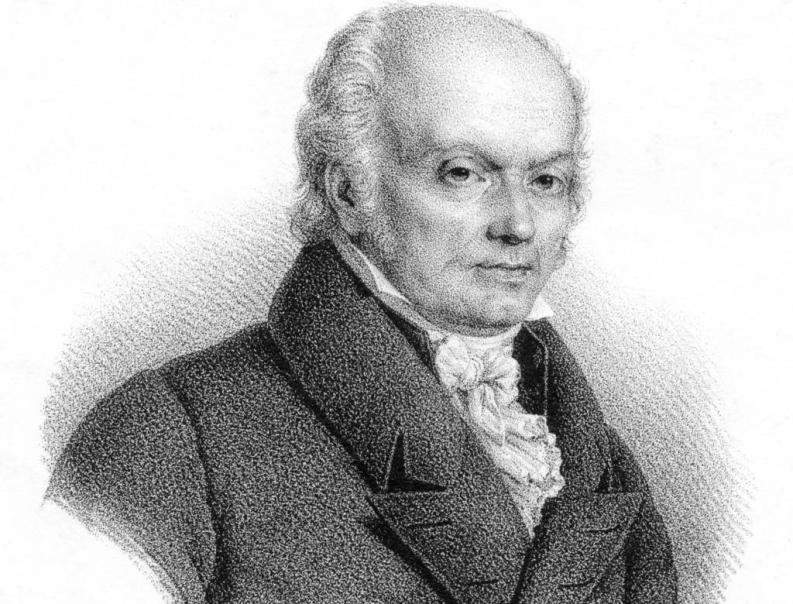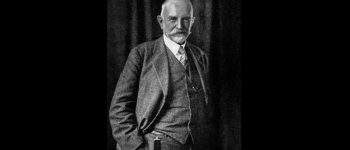Biography of Franz Gall (1758-1828)

- 3653
- 540
- John Von
Franz Joseph Gall was born on March 9, 1758, in Tiefenbronn, Baden, Germany. The most interesting thing about his life is that the impact of his theory remains important, although he failed to make his assumptions into science. For better or worse, very few could be silent before Franz Gall's controversial opinions, who considered that each area of the brain corresponded a function, And this would serve to make predictions at the psychological level.
Content
Toggle- Who was Franz Gall
- Franz Gall's curiosity
- His years as a student
- His agitated life
- Gall achievements
- He laid the foundations for neurosciences
- Bibliography
Who was Franz Gall
Franz Gall, who died in Paris in 1828. He was a German anatomist and physiologist who gave rise to frantology, A set of knowledge that could never obtain the science seal, but, until today, is considered an incorrect pseudoscience or position with respect to the true functions of the brain. Through frantology, Franz Gall intended to make predictions on the personality of individuals, their behavior and intellect, studying only the shape of their brain.
For Gall, Mental functions were located in specific regions of the brain, But, even the conferences in which he intended to demonstrate this position were suspended because they were considered offensive, especially for religious leaders. In 1802 the Austrian government also condemned them, estimating that these meetings were contrary to religious precepts. The persecution that Gall lived made him leave his country.
Franz Gall's curiosity
Franz Gall came from a family of noble origin; His father was a wealthy merchant, with Catholic beliefs. In Lombardy, a place of origin of the Gall family, they were considered prominent leaders, so much so that their father came to occupy the position of mayor in the community of Tiefenbronn.
Since Gall was a young man, his passion for research led him to try to answer the most disturbing scientific questions. Above all, He was struck by the differences that existed among his brothers, his classmates and himself. This is why, at an early age, he began to consider that there should be a connection between the brain and the skills that a person possessed and that he made it different from the others.
This was accompanied by his interest in the collection and classification of plants and animals. Also, from a young age he noticed how important the observation for the study was. Franz Gall, being the second of the children, had a future destined for the priesthood, however, His research desire was his greatest vocation, For what, as soon as possible, he began studying medicine at the University of Strasbourg.
 Biography of George Herbert Mead (1863-1931)
Biography of George Herbert Mead (1863-1931) His years as a student
During his years as a student, Franz Gall returned to the observation technique and realized that, Among his companions, the brightest were those whose eyes were prominent. This detail led him to conclude that it could not be a coincidence, but something else.
The degree in Medicine ended in Vienna, Austria, where he studied with other personalities such as Maximilian Stoll and Johann Hermann. From these colleagues he learned how important natural observation was. Gall's popularity came quickly. Franz, in his adult stage, and after working in a psychiatric, He started working privately, gave conferences and his fame arrived soon.
This notoriety caused him to be offered as a chief doctor in the court of Austria, however, he rejected it to continue in the field of research and private exercise. Although he was married, Gall had no children. It is known that some descendants, by their brothers, lived in Germany almost until the fifties. Today, several of their relatives live in Austria, where the Rollet Museum is also located, specifically in Baden Bein Wien, and in which a collection of Gall skulls rests.
His agitated life
Franz Gall had a very agitated life due to the curiosity caused by his dissection work and the number of attendees who followed their conferences. In 1800, doctor Johann Spurzheim was hired by Gall, as assistant in medical demonstrations. By 1804 he was already a full -time partner. However, after working for many years in the structure of the brain, in 1813 Spurzheim separated to reach own notoriety in Great Britain.
Later, Gall himself accused Spurzheim of having plagiarized his work and having changed the essence of it. But it was Spurzheim who actually called Gall's work as frenology.
Gall achievements
Beyond all the persecutions that Gall lived and the convictions that his work suffered, Franz should be recognized the progress made in the field of dissection, since, by then, these were not practiced with order. Gall, on the other hand, made a slow and methodical analysis of the brain, focusing on the division of each fiber, which led to later others adopted this methodology in the cuts.
Although Franz Gall was chosen in 1823 as a foreign member of the Royal Academy of Sciences, in Sweden, his theory was criticized by science itself, considering that his postulates did not meet rigor. Likewise, Other scientists campaigned against him for estimating that Gall had taken Charles Bonnet's central ideas, Without having given you credit.
María Antonieta's brother, José II, in his court did not accept it either. In many parts Gall's ideas were taken as a threat to morality. After Gall was forced to leave his position as a professor in Austria, due to the repeated sentence he suffered, He moved to Paris, where he found a more conducive atmosphere for his investigation. But not even in revolutionary France found space, because Napoleon Bonaparte himself declared that Gall's science was invalid.
 Biography of Charles Daniel Batson (1943)
Biography of Charles Daniel Batson (1943) He laid the foundations for neurosciences
Regardless of these facts, Franz Gall was able to ensure a comfortable life, thanks to the success he had already had. In addition, many saw it as a celebrity in the Parisian halls. Today it is already known that frantology is not a correct path And, on many occasions, the theory that the personality of a subject would be determined by the form of the skull continues to be refuted.
However, for their time, these arguments were attractive and intriguing. But, beyond all this, although it is known that frantology does not enjoy scientific acceptance, It can be said that Franz Gall sat the foundations for the neuroscience to later emerge And work will be worked hard in the location of regions in the brain and its functions.
Gall's braking: 7 assumptions
Bibliography
- Ening, p. (Ed.). (1994). Reader in the History of Aphasia: From Franz Gall To Norman Geschwind(Vol. 4). John Benjamins Publishing.
- Gall, f. J. (1835). On the function of the brain and of each of its parts: with observations on the possibility of determining the instincts, prone thanisies, and talents, or the moral and intellectual devices of men and animals, by the configuration of the brain and head(Vol. 1). Marsh, Capen & Lyon.
- Van Wyhe, J. (2002). The Authority of Human Nature: The "Schädellehre" of Franz Joseph Gall. The British Journal for The History of Science, 17-42.
- Zola-Morgan, s. (nineteen ninety five). Location of Brain Function: The Legacy of Franz Joseph Gall (1758-1828). Annual Review of Neuroscience, 18(1), 359-383.
- « Menstruation and its connection with the mind
- Sitting depression is not enough is a real disease »

